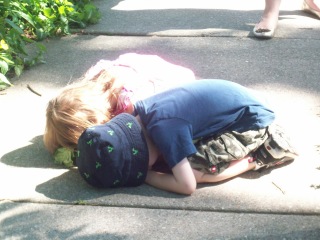>
I don’t remember meeting Robert D. Rogers; I just remember his being there. Always. From the age of eight or nine until we moved when I was twelve, Robert D. Rogers was always there.
I never called him anything else. He was never Bob or Bobby, Rob or Robbie. Sometimes his mother called him “Dee”. He didn’t like it much.
Everyone knew a Robert D. Rogers. Mine was blonde, the kind of blonde that renders one’s skin allergic to sunlight, the kind of skin that blooms bright red with the slightest physical exertion. Ever-moist cheeks the color of maraschino cherries only served to accentuate his otherwise pasty pallor. And, his nose was more than crusty. It was dirty. We never touched. I never forgot.
Robert D. Rogers was a bit of a story teller. For those of you not raised in a southern state during a time in which all public facilities featured shadows of the words “White” and “Colored” under a fresh coat of institutional paint, story teller meant liar. He told tall tales, grandiose tales of his family, or his abilities, or his adventures. His cheeks would often cherry as he told, and I knew that he knew that we knew that he was lying. But he didn’t stop. He went on until another boy, an athletic boy, a boy the other boys followed, made him stop.
Sometimes they stopped him with words; it always started with name calling. But, Robert D. Rogers was tenacious. Sometimes the words didn’t stop him. Sometimes the only sign he’d heard the words was the tears that collected in the inside corners of his pale blue eyes. And, he kept talking.
When words didn’t work, they used their hands. They pushed. Each push deepened the scarlet of Robert D. Roger’s cheeks, and he kept talking. They pushed harder. Falling to the ground knocked the tears from his eyes; they streamed down his face as he sat there, and I screamed.
Silent, but loud enough to crowd out any noise other than his occasional sob, I screamed, “Don’t get up! Please, don’t get up!” He didn’t, until they left. Sometimes I stayed behind to help gather his books, or his lunch.
We didn’t talk. Perpetually dirty hands left brown tracks on either side of Robert D. Roger’s milk-white face as he swiped at his tears as though punishing them for falling. I looked away.
His weakness provoked young and old, alike. The first and only time I every heard my father use the word “Queer” was in reference to Robert D. Rogers, as in, “Why do you hang around with that Queer?”
I didn’t know how to answer. I hadn’t actually heard a person call another person “Queer” in person. I didn’t expect that person to be my father. I answered with all the eloquent defensiveness an eleven-year-old could muster.
My father and I debated frequently, usually about race. I remember proudly hurling the word “underdog” into his blustering face. To this day, I hear the word and an image of Robert D. Rogers flashes through the View-Master inside my head.
And, all the while, I knew he brought it on himself.
“If you would just be quiet!”, I should have said.
If he had minded his own business.
If he had allowed the life he led to be enough, they would have left him alone.
But he couldn’t, and I knew, so I didn’t.
© Copyright 2007-2010 Stacye Carroll All Rights Reserved

